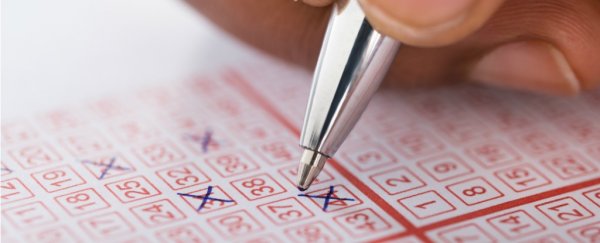You know what sounds pretty great? Finding out that you've won the US$700 million Powerball jackpot.
The lump sum minus taxes yields about US$293 million to play with, depending on where you live. Divide that by two or three to account for multiple winners, and it's still a ton of money.
Buying a ticket may not be a financially rational decision, but you'd still have to imagine that winning even a chunk of that money would make you super happy…right?
If you're not happy already, winning the lottery actually might not make a difference in the long term.
The psychology of rolling in piles in cash
There's some fascinating research on the psychology of lotteries. Studies have shown that people are compelled to buy tickets because we have a hard time processing just how unlikely a win is and we give ourselves reasons to think we could somehow win.
Some research has also suggested that the desire to play the lotto may be stronger among people with lower incomes who hope to escape difficult financial circumstances.
But perhaps most interestingly, research indicates that winning the lotto doesn't make people happier long-term. Contrary to popular myth, however, it doesn't seem to make people more likely to go on spending sprees that leave them broken and unhappy, either.
Winners mostly report ending up about as happy as they were before winning.
A classic 1978 study on this compared 22 lotto winners to 22 control-group members (who didn't win any money) and to 29 people who were paralysed in accidents.
In general, the lottery winners reported that they were happier than the paraplegics and quadriplegics - a 4 out of 5 instead of a 2.96 out of 5.
The control group averaged 3.82 out of 5, not significantly different from lotto winners. However, lotto winners reported getting the least enjoyment from what researchers called "mundane pleasures" - enjoyable aspects of everyday life like eating breakfast or talking with a friend.
Researchers were surprised that lotto winners didn't report being significantly happier than non-winners, and that accident victims reported being above the scale's mid-point (2.5).
Overall, winning the lottery didn't increase happiness as much as others thought it would, and a catastrophic accident didn't make people as unhappy as one might expect.
As Melissa Dahl noted in Science of Us, this is how the authors described the way winning might make it harder to enjoy everyday life:
"Eventually, the thrill of winning the lottery will itself wear off. If all things are judged by the extent to which they depart from a baseline of past experience, gradually even the most positive events will cease to have impact as they themselves are absorbed into the new baseline against which further events are judged.
Thus, as lottery winners become accustomed to the additional pleasures made possible by their new wealth, these pleasures should be experienced as less intense and should no longer contribute very much to their general level of happiness."
Hedonic adaptation
Although 1978 analysis was a small study, a 2008 study of Dutch lottery winners reported similar findings.
Those authors found that people who earned more money reported being happier (something psychologists have found is true only up to a certain income threshold), but "lottery winnings do not make households happier."
The concept at play here is called "hedonic adaptation." People have been shown to return to a kind of "set point" of happiness after events that we assume will have a big impact on how we feel.
"Some of us have our thermostat set to happy. Some are set to depressed. Meanwhile, others are somewhere in between," psychologist Robert Puff wrote in Psychology Today.
"When we experience a major event, say winning the lottery or becoming paralysed, our thermostat may temporarily swing up or down. But over time, it returns to its usual setting."
There are things that we can do to influence our own happiness, however, including cultivating strong relationships, spending time and money on fun experiences, and exercising.
Perhaps a lucky lotto winner could devote their newfound wealth to those sorts of goals. But winning itself doesn't seem to be enough to boost happiness long-term.
Still, it's pretty fun to imagine what that money could be used for - a mental state some psychologists say is perhaps the best reason to play the lotto in the first place.
This article was originally published by Business Insider.
